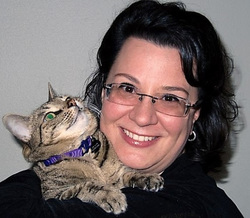ASSAY: A JOURNAL OF NONFICTION STUDIES
2.2
2.2
|
Until a few years ago, memoir was all I could write, but none of it seemed meaningful. I often centered myself as hero, struggling against the forces of evil, all of which (I believed) were specifically bent on placing impediments on my path to truth, justice, and overall excellence. I wasn’t asking anything from anyone else except to realize just how heroic I was. Although memoir can be its own act of truth-telling and heroism, the injustices I wrote of now seem petty. We have all tried, at some point in our lives, to explain ourselves to others. We have all had those moments of trying to reveal something about ourselves to someone else, only to have it backfire and make us retreat back to our comfortable, great-misunderstanding shell, refusing to poke our heads out for quite a while.
We are misunderstood, again. No one gets us. That is all. Fin. My younger self wanted to be noticed. Memoir-writing was a form of “look at me!” It was performative. My current self longs for sympathy. For dialogue with like-minded individuals. For understanding, on some level, if not directly, something close enough. Memoir-writing now asks “do you feel these things too? Or am I alone?” I find myself in a different part of my life, older and more compassionate, and I approach the task of writing memoir with a kind of fear. Inherently, memoir calls for us to reveal ourselves to others, but it requires a level of self-reflection that I wasn’t ready for until now. I am ready to admit that I could use some sympathy. I certainly don’t want you to feel sorry for me or to see me as a put-upon hero of my own story. I am imagining sympathy as William James imagined it—a readiness to meet some kindred spirits and to begin to try to understand one another as best we can. In speaking directly to one another, and using language that resonates with one another, we will begin to recognize each other and perhaps feel less alone. _________ In The Argonauts I found myself drawn to the conversations Maggie Nelson had with her intellectual mentors as well as with herself. These conversations made me think about my own intellectual history, especially my understanding of the self and how the self relates to other selves. When Nelson writes “I’ve explained this elsewhere. But I’m trying to say something different now,” I felt that phrase as a moment of understanding from her, as a gift. Perhaps I, too, am able to try to say something different now. In trying to make sense of this shift in my writing and my own perspective (from hero to somewhat-adequate human), I went back to the philosophers who informed my understanding of what it means to be a self in the world and started to more closely examine my compulsion to write memoir now. I asked myself why I want to most engage with others now through memoir when I have so much more to lose. As I reread Ralph Waldo Emerson, Friedrich Nietzsche, William James, and Jean-Bertrand Pontalis, I asked myself the following questions: Am I trying to explain myself? Am I trying to make sense of my past? Will I be able to say something different now? Will I be able to be someone different now? Or am I simply willing to admit that I don’t know exactly what I’m doing in life in the hopes that someone else will stand beside me and say, “Me either”? The younger version of me: uncomfortable in my own weirdness. I was immersed in the anxiety of being odd and everyone I encountered told me just how odd I was. Or, perhaps, I can only remember the comments of those who were specific enough, because that’s how memory works. If it’s bad, bring it on so I can hoard it and recall the exact turn of phrase and tilt of the criticizer’s head. Good? Well, I may or may not hear it and most certainly will not retain it. _________ I received my initial intellectual grounding of self-awareness in Mrs. O’Brien’s English class. It is thanks to Mrs. O’Brien that I met the first writer who spoke to me (directly, I was convinced). Every notebook I have ever had since 11th grade, including my most recent, has somewhere written in it “to be great is to be misunderstood.” Ralph Waldo Emerson’s essay “Self-Reliance” seemed a battle cry to my misunderstood heart. Emerson understood me. I wasn’t odd at all, I reasoned. I’m simply misunderstood, ergo, I must be great. As I read “Self-Reliance,” I found exactly what I needed to hear at the time: a call against “foolish consistency” and conformity. I disregarded everyone else because I was meant to be different; that difference set me apart from my classmates and others and set me up for greatness. This moment of awareness was the beginning of my hero complex, but also something else. It set me on a path to not communicate well with others. I had been shamed and shunned previously for sharing my thoughts and feelings. In this way, my reading of Self-Reliance gave me the permission (or the excuse) to build some kind of protective shell of misunderstanding around myself and to think that this was acceptable. Something cracked in this idea of self-congratulatory greatness my first time in graduate school. I was working full time, going to school part-time, recently married, and found myself reading Emerson in a different way. I read Emerson in context, not just a single essay. I learned more about his life through his journals and letters, and about other writers and poets from his era. As Emerson suffered loss, he moved away from misunderstanding as the key to greatness and seemed to settle for something else, something not so great: “To fill the hour—that is happiness; to fill the hour, and leave no crevice for a repentance or an approval. We live amid surfaces, and the true art of life is to skate well on them.” To fill the hour with what? As long as it was to be filled, and filled with anything, there was no time for self-reflection. And what was this skating on the surface business? Emerson had just lost his son, and I reasoned that he must have decided it was better to feel less, or not at all. Although I had my doubts about living a life less examined, he was my first intellectual hero who personally understood my misunderstood greatness. I became a skater, living life on the surface, and trying hard not to think too deeply about anything, not to write deeply either. _________ Skating on the surface of life is only a satisfying proposition for some of us, for a moment of time in our lives. Eventually we start to crave something more, to figure out what we are meant to be doing, to find a life-partner who understands us, to find a true friend or two (we won’t be too greedy), to have a moment of intellectual clarity, to even have a moment of true self-awareness. Continuing to skate on the surfaces gets us nowhere closer to “the more.” Filling every piece of time with some sort of busy-ness leaves no time for self-reflection. I have come to believe that constant distraction is a goal that many strive for in this, our modern life. Why think about the terrible way we treated someone when we can follow something more pleasant on social media? Why leave the job where we have no joy or satisfaction if the pay is good? Why engage with a difficult person? Why be anything other than who we are right now? These moments of questioning cause fear: they call for us to risk revealing our imperfect selves to others. When we read, we often find exactly the things we are looking for and try to join them together even though they don’t necessarily mean the same thing. For a while, I wondered if Emerson and Nietzsche were kindred spirits, but only because I found myself reading the more positive aphorisms of The Gay Science. After reading more closely, Nietzsche did help me question Emerson: “Have we ever complained about being misunderstood […]. This is precisely our fate…oh, for a long time yet!” This quote gave me pause: misunderstanding with no greatness attached. I hadn’t thought of that. What if it was simply my Nietzschean fate to bumble-stumble through this world, misunderstood? Could I live with that? At this point, thinking about Nietzsche’s proposition caused me great discomfort. I was committed to being a skater and to living in some kind of protective tortoise shell of greatness, reveling in being misunderstood. _________ Personal discomfort became a regular feeling. As I moved further away from literature and writing, my true loves, I delved into philosophy. I was not looking for discomfort—I was looking for answers—but this intellectual discomfort gave me the false sense that I was figuring things out, that I would have answers. That I would finally stitch together a whole person. I recently heard the expression “pulling at a thread” and now can articulate that’s what it felt like. I feared becoming a tumbled mass of not only fabric, but also of buttons, zippers, washing instruction tags, and threads heaped on the floor. But I could not stop picking, pulling. I was not ready to stitch together my disparate parts. This idea of being misunderstood whether because of “greatness” or “fate” made me wonder why we are compelled to engage with others at all. We risk revealing ourselves to others every day, opening ourselves to ridicule or judgment. Why would we do that? I think we are hoping for a better payoff: that eventually we will meet someone who understands us at some level. We can only live alone in our shells for so long. Around this time, my much-beloved philosophy professor showed kindness toward me. As I sat across from him during a special appointment (outside of office hours!), he tamped his pipe with tobacco and gently broke it to me that the questions I had about understanding and being understood were unanswerable. I sat in silence as he explained that these were questions I would ask my entire life, but that there would be no relief from my present situation of thread-pulling. Not now, not ever. This was part of the condition of being a self-aware human being, he told me. I remember thinking how wrong he must be, but I was too dumbfounded to say anything, much less disagree with him. I thanked my professor, left, and went to the campus bar, where I continued reading Emerson and Nietzsche and drinking beer. It seemed like the appropriate response to my self-pity: if the person I trusted the most in the world with my brain misunderstood me, what hope did I have? I tucked my head in, ready to retreat for an even longer period of time. Of course, it wasn’t that he misunderstood me. He was pushing me toward a deeper line of inquiry. He introduced me to the French writer and psychoanalyst, Jean-Bertrand Pontalis, who had recently released his memoir Love of Beginnings. Pontalis’ memoir is the first memoir I read that initiated more questions than it answered. The structure comprises the expressions of his own intellectual curiosities, not necessarily a chronological story of his life. Rather than advance himself as an expert of his own life, it seemed that he didn’t propose to know anything at all, and that the more he thought about himself, the less he knew. It was very Montaignian of him. He constantly quizzed himself and, through his self-reflection, invited us as readers to try to understand who he was. It was like a person-puzzle, and I was game. The structure of his memoir—grappling with big ideas rather than chronological recollections—allow space for the reader to ask questions along with him. His questions were not simple: What was the meaning of time? What was the meaning of his curiosity about the meaning of time? How did he understand time differently when he was a radio announcer running a program on a precise schedule, as opposed to how long it took to burn his morning croissant? It was through Pontalis that I started to gain a different insight into both memoir and this misunderstood business. He did not advocate for being greatly misunderstood or simply misunderstood. He started with the premise that being misunderstood is part of the human condition. He asked was what it might be like if we all just tried to do a better job of explaining ourselves to others. Pontalis also believed that we open ourselves to others in order to explain our “disarray.” Initially, I was drawn to this idea because I myself feel like a jumbled mass at times—still all the fabric, buttons, threads heaped on the floor—and this disarray seems like a reasonable explanation for why I don’t have my act together yet. If we stop for just a moment, we can think of a time when we’ve apologized for asking a question, or as a verbal tick as we are about to bring up something important to us. “I know this is crazy, but…,” “I’m not sure if this is what you’re looking for, but…” It’s not true revelation, though. It’s a way out, a protection against being misunderstood further. In the event someone does not understand what we are saying, we can reply that we were only speaking nonsense. We warned them, after all. _________ How might we understand our desire to reveal ourselves to others then? William James proposed that we have an “innate propensity to get ourselves noticed, and noticed favorably, by our kind.” This seems to be a precursor to the something more that was missing from my initial readings of Emerson, but this idea doesn’t go deep enough. Instead, I find the beginnings of an answer in James’ letter to his friend, Thomas Ward, that we keep trying to engage with others because “we long for sympathy, for a purely personal communication, first with the soul of the world, and then with the soul of our fellows.” James validates this desire to not just belong, but to be in sympathy with others. We find ourselves in all phases of our lives building relationships with others in the hope of finding like-minded individuals. Even though we understand intrinsically that there will most likely not be a one-to-one correlation, translation, or relation, we keep trying. I like this idea of sympathy, but it raises further questions. We can understand that memoir serves as an introduction of our self to others. But what will the reception of our self be? Can we ever really be understood by others? Why is it important to us to be understood? To keep trying? James’ idea of getting noticed favorably might be the initial impetus, but I believe it is the satisfaction we feel in ongoing communications and exchanges of feeling that makes us keep trying to be understood. Our own humanity and desire for discourse and sympathy keeps us from living alone for too long in our respective tortoise shells. _________ My recent work is an exploration of the memoir form with photographs. I work in present tense, with second person narration, and with people-less photos—hoping you can see yourself there, right now, experiencing these things in these particular places. Will this create the necessary tension and desire to invest personally in understanding a specific series of experiences when I am not only trying share them with you, but also working to put you in this same place, physically and emotionally? Does this investment mean that the author, I, can be understood by the reader, you? I am longing for sympathy with you. In sharing these moments, I am revealing myself and asking you to engage with me. To recognize a similar experience. To share a similar emotional response. You feel it too, don’t you? |
|
You smile and nod politely at her, at me. You know this is important to me; I’m sharing it with you, specifically. But my experience isn’t translating directly and, really, your mind is starting to wander. Perhaps you are hoping there might be something more interesting to read right now. You realize though, that it is personally meaningful for me to tell you about this particular day. And, I realize by sharing this day with you, I become more cognizant of how I remember things—not through any sort of specifics (day, date, time, temperature, etc.), but through feelings: cold, hunger, loneliness. This is how your memories form as well—at least for a few of you, anyway. Maybe now you are thinking of how you remember things. You may nod in agreement here—something resonates. Together, we have the beginnings of understanding, of sympathy.
|
Click here for a downloadable PDF.
|
Stacy Murison is completing her MFA in Creative Nonfiction at Northern Arizona University under the guidance of Nicole Walker. When she’s not reading and writing essays and teaching English composition, she spends hours contemplating the movement of ants across the expanse of her backyard and watches too many zombie movies. You can read her work at Assay, McSweeney’s, Queen Mob’s Tea House, and Flash Fiction Magazine. Follow her on Twitter @caseystay.
|



